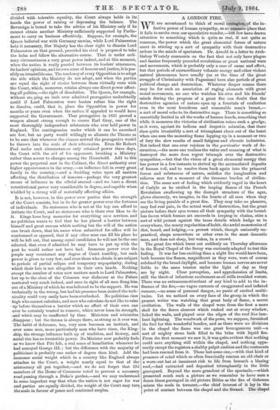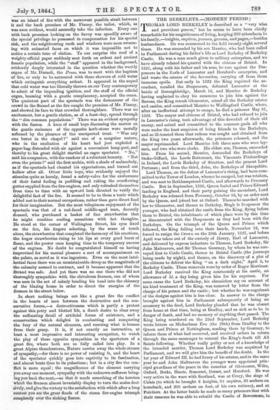A LONDON FIRE.
WE are accustomed to think of moral contagion, of the in- fective power of human sympathy, as so common-place that it fails to excite even our speculative wonder,—but few have drawn attention to something which is quite as real, if not quite as common, the power which the great elemental forces of nature exert in stirring up a sort of sympathy with their destructive ardour in the minds of spectators. Dr. Arnold in a letter to Arch- bishop Whately comments on the fact that not only have plague and famine frequently preceded revolutions or great national wars and movements, which is probably only a case of cause and effect, but that periods of extraordinary volcanic energy and other violent natural phenomena have usually (as at the time of the great struggle of Christianity with Paganism) been also periods of great political change and destruction. Whatever deeper reason there may be for such an association of raging elements with great moral movements, no one who watches his own and his friends' minds during the progress of a great fire can doubt that the destructive agencies of nature open up a fountain of exultation even in the most humdrum and reasonable man's breast,— a sort of moral echo to its destructive rage. There is something so essentially limited in all the works of human hands, something that while it measures the victories of civilization raises such a grudge, as it were, against its tedious and despotic minutite, that there rises quite irresistibly a sort of triumphant cheer out of the heart when one sees the mounting flame lapping up in a moment or two of fury the slow results of small fatigues and chronic industries. Not indeed that one ever rejoices in the particular work of de- struction,—the more one realizes the value and meaning of what is destroyed the more does regret triumph over the destructive sympathies,—but that the vision of a great elemental energy that has power in a few instants to shrivel up the accumulated deposits of human toil, and to resolve them back again into the primeval forces and substances of nature, satisfies the imagination and relieves men for a moment of the tiresome burden of civiliza- tion. The same sort of feeling which evidently raged in the heart of Carlyle as he exulted in the leaping flames of the French Revolution swallowing up the decrepit structure of the ages, glows obscurely, we imagine, in the hearts of all men when they see the living parable of a great fire. They may take no pleasure, may feel real pain, in the actual work of destruction, but the great picture before their eyes rouses all their sympathy with the bound- less forces which human art succeeds in keeping in chains, stirs a sort of wild protest against the tame details which hedge us in everywhere, the musty regularities of habit, the awful monotonies of diet, board, and lodging,—a protest which, though eminently un- practical, sleeps somewhere or other even in the most domestic man, and does not sleep, but wakes, in a crowd.
The great fire which burst out suddenly on Thursday afternoon in the Royal Chapel of the Savoy was curiously adapted to test this feeling. It was far less exciting than a night fire would-have been, both because the flames, magnificent as they were, were of course subdued by the broad daylight, and because human nerves are never liable to the same tension under the light of day as they are by night. Clear perception, and apprehension of limits, still the throb of infectious excitement as oil stills troubled waters. There was no extraneous stimulant of any kind to add to the in- fluence of the fire,—no vague currents of exaggerated and inflated rumour,—no sense of personal danger, no panic of excited multi- tudes. Yet we noticed on every face of the group in which the present writer was watching that great body of flame, a secret exultation. The walls of the chapel were from the first a mere shell for the fierce element which rushed out at every window, licked the walls, and played over the edges of the roof like lam- bent lightning. The woodwork of the pews, we suppose, furnished the fuel for this wonderful bonfire, and as there were no divisions in the chapel the flame was one great homogeneous unit —a sort of mighty stone bath filled to the brim with liquid fire. From the first moment we saw it, it was quite evident that nothing could save anything still within the chapel, and nothing appa- rently except the registers a shabby pulpit cushion and the vestments had been rescued from it. These last some one,—with that kind of presence of mind which so often frantically rescues an old chair or a worn-out hat at imminent risk to life from beneath a blazing roof,—had extracted and deposited triumphantly in the little graveyard. Beyond the mere grandeur of the spectacle,—which presented much such a picture as we remember to have seen a dozen times portrayed in old picture Bibles as the fire of Gehenna minus the souls in torment,—the chief interest of it lay in the point of contact between the chapel and the Strand. The chapel
was an island of fire with the narrowest possible strait between it and the back premises of Mr. Finney, the tailor, which, as was soon evident, would assuredly take the infection. Every one with back premises looking on the Savoy was speedily aware of the special privilege he possessed in compensation for his special risk, and the neighbouring roofs and windows were soon swarm- ing with animated faces on which it was impossible not to notice a certain tone of elation. To our surprise the roof of a weighty official paper suddenly sent forth an ardent and ancient female population, while the " staff " appeared in the background, evidently deeply interested in the question whether the weekly organ of Mr. Disraeli, the Press, was to meet with the baptism of "fire, or only to be saturated with those showers of cold water which extinguish everything ardent. It appeared in the sequel that cold water was too liberally thrown on our Tory contemporary to admit of the impending ignition, and the staff of the official organ, beaming with a gentle complacency, accepted the omen. The quaintest part of the spectacle was the demeanour of the crowd in the Strand as the fire caught the premises of Mr. Finney, and showed its face to that crowded thoroughfare. There was no excitement, but a gentle elation, as of a feast-day, spread through the "dim common populations." There was an evident sympathy with the flames. A knot of small boys discussing the matter on the gentle eminence of the opposite kerb-stone were morally softened by the pleasure of the unexpected treat. "Was any one burnt in the chapel ?" said one of a sanguine nature, who in the exultation of his heart had just exploded a paper-bag distended with air against a convenient lamp-post, and thereby to his great delight startled an eager spectator. "No," said his companion, with the candour of a reluctant honesty. "Not even the priests ?" said the first urchin, with a shade of melancholy, as if the spectacle had cheated his expectations, and turned out hollow after all. Other little boys, who evidently enjoyed the stimulus quite as keenly, found a safety-valve for the exuberance of their festal feeling in paddling and raking the overflowing Rutter supplied from the fire-engines, and only refreshed themselves from time to time with an upward look directed to verify the delightful fact of the fire. It seemed to be to them a tonic which added zest to their normal occupations, rather than gave direct food for their imagination. But the most voluptuous enjoyment of the spectacle was that of a red-faced middle-aged man, decently dressed, who purchased a basket of fine strawberries that he might combine cooling sensations with hot thoughts. He stood at the corner of Wellington Street, his eyes fixed on the fire, his fingers selecting, by the sense of touch alone, the strawberries that completed the harmony of his emotions, the huger strawberries rising to his lips at every good burst of flame, and the poorer ones keeping time to the temporary success of the engines. No doubt he congratulated himself on having improvised for his mental pleasure a sort of accompaniment on the palate, as novel as it was ingenious. Even on the most intel- lectual faces there was an unmistakeable droop as the magnitude of the calamity seemed to contract, and it became apparent that the Strand was safe. And yet there was no one there who did not thoroughly sympathize with the chivalrous firemen, one of whom was seen in the act of calmly bending his head into the chimney of the blazing house in order to direct the energies of the firemen in the street below.
In short nothing brings out like a great fire the conflict in the hearts of men between the destructive and the con- servative forces,—a destructiveness which is partly a protest against this petty and blotted life, a dumb desire to clear away the suffocating detail of artificial forms of existence, and a eonservatism which delightis in combatting and conquering the fury of the natural elements, and rescuing what is human from their grasp. It is, if not exactly an instructive, at least a most impressive and interesting occupation, to watch the play of these opposite sympathies in the spectators of a great fire, where both are so fully called into play. In a great Alpine thunderstorm, Nature carries away the whole stream of sympathy,—for there is no power of resisting it, and the heart of the spectator quickly goes into captivity to its fascination, and almost beats time to its pulsations ; but in a city fire the con- flict is more equal ; the magnificence of the element carrying you away one moment, sympathy with the unknown sufferers bring- ing you back the next,—so that it needs something of the heroism which the firemen almost invariably display to turn the scales deci- sively, and give the victory to the satisfaction with which after a long contest you see the great floods of the steam fire-engine triumph completely over the sinking flames.































 Previous page
Previous page